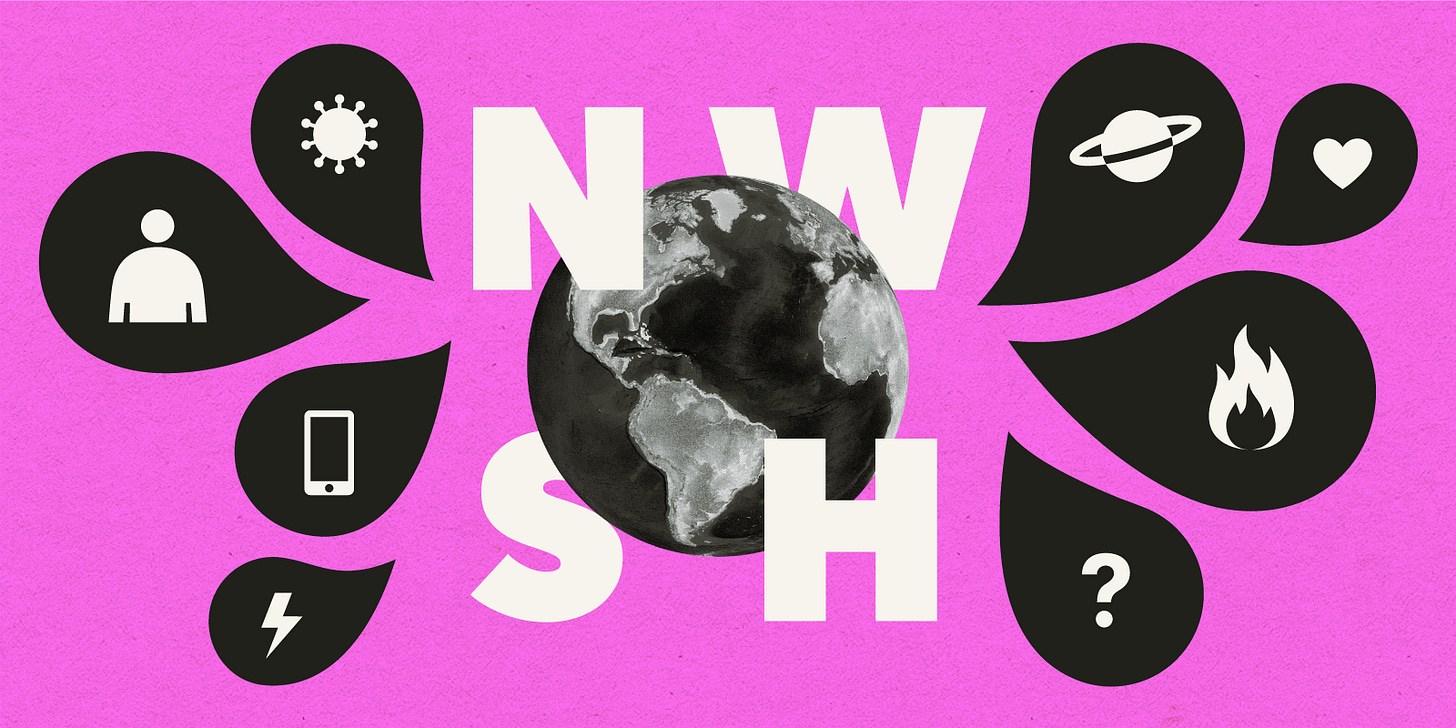New Week #138
The next status symbol is disconnection
Welcome to this update from New World Same Humans, a newsletter on trends, technology, and society by David Mattin.
If you’re reading this and haven’t yet subscribed, join 25,000+ curious souls on a journey to build a better future 🚀🔮
To Begin
A quick note, this week, on a single story that caught my eye.
The UK’s most prestigious public school — readers outside the UK would call it a private school — has announced that pupils joining this year will not be allowed to carry smartphones.
Hardly life changing for most of us. But I think it’s a signal of a far broader emerging shift that will impact us all.
Let’s go!
🧠 Mind Games
To call Eton storied would be an understatement.
The school was founded in 1440 by a king. Henry VI, if you’re interested, whose reign was full of trouble because of the Hundred Years War and his chronic indecisiveness. Over the years it has educated any number of subsequent English kings and 20 UK prime ministers. The phrase old Etonian is synonymous with privilege. Fees are £52,000 a year.
This week the school sent a letter to the parents of all new joiners — 13-year-old boys, who will board at Eton until they are 18 — informing them that pupils should not bring a smartphone with them when term starts.
Instead, each new boy will be issued with a Nokia ‘brick phone’ on their first day, which they can use to make calls home.
Eton says this measure has been taken to deal with the problems created by phones, including ‘issues around socialisation, misuse and overuse, and the impact on both mental and physical health.'
I never expected Eton to come up here in NWSH. Why does this matter to us?
As I’ve mentioned before, whenever I go inside an organisation to talk about emerging technologies — and at the moment that usually means AI — the question I’m asked more than any other is: what do I tell my children?
That’s the deep context here. Rising numbers of people feel that they and their children are strapped to a rollercoaster future steered by intelligent machines. They’re looking for a way to take back some measure of control.
Meanwhile, though, this isn’t just about what is coming. It’s about where we are now.
We all read about the social psychologist Jonathan Haidt and his new book The Anxious Generation earlier this year. Haidt argues that phones and internet culture are corroding the mental health of young people. His book taps into a broader trend to reexamine the role that the internet plays in our lives.
I’m a parent of twin boys aged ten. If you’re a parent too, you’ll know the endless and infernal struggle when it comes to devices, or screen time as we’ve collectively decided to call it. My boys have not been allowed phones yet (yes, they’ve asked) but they play video games and watch YouTube on a family Kindle. And, basically, I wish they didn’t; or at least that they didn’t so much. Every parent I know wishes their child spent less time staring at a screen.
Against this context, I think Eton’s move is the right one. I hope the UK’s state (as in, government funded) schools follow suit soon.
And perhaps they will. Because when we see a school like Eton move against phones, it’s a powerful indication of where the broader culture is heading.
I’m convinced that it’s going to become a straightforwardly high-status, elite play to renounce phones, social media, and many other aspects of digital culture. In a world of insane information abundance and always-on connection, reclaiming the stillness of your own mind will be akin to flying private.
If I’m right, we’ll see a growing divide between those who can afford to disconnect and those who must remain connected. Replete with material and cultural capital? Ditch your phone, delete X and Instagram, and luxuriate in the privilege that is Undistracted Human Consciousness. Need to pay the rent? Keep (doom)scrolling, and don’t worry too much about all those flame wars and ads: most of them are AI generated!
In so many ways to live in 2024 is to be subject to a constant and all-out assault on our attention. It’s the ability to attend to anything — a book, another person, ourselves — that is being eroded. I’m increasingly convinced, then, that the next big vector for inequality is around this most fundamental of human capabilities. The elites are going to reclaim the ability to chain together more than three thoughts in succession before reaching for a device. The masses will be forced to contend with ever-more targeted and addictive forms of distraction.
I wouldn’t be surprised to see other elite schools copy Eton’s move across the coming weeks. In this way and so many others we’ll see the children of the elite further advantaged — this time by schools and parents who place strict guardrails around their online lives. This has the potential to create powerful new forms of cognitive inequality, which will result in inequalities of outcome.
And one final thought: see all this through the creatures and machines thesis that I wrote about last week, and it gets even more intense.
When we think about human augmentation with AI, we tend to envision it as an elite pursuit. We tend to think, that is, that there will be the few who are rich and lucky enough to augment themselves, and then the rest.
But perhaps the reverse will be true. The rich will be the ones with the freedom to remain non-augmented and experience a pure, unsullied human consciousness. The masses, on the other hand, will find they must augment themselves with AI in order to remain economically viable. Sure, superhuman intelligence is great, but have you tried Premium-Grade Organic Mind, the way our ancestors used to have it? It’s amazing.
So the creatures get to live in off-grid, secluded, and non-augmented peace, and to inhabit modes of consciousness that remain recognisably human. The machine folk must submit to ever-more radically alien forms of cognition in order to remain useful.
Okay, this is becoming speculative. Maybe I’ll turn it into a short story. I’m ever-more convinced that the creatures and machines polarisation will be hugely consequential, and this yet another important dimension.
Back in the non-augmented present, though, remember: this move from Eton is a powerful signal. Where rich and high-status people go today, the masses follow — or at least try to — tomorrow.
I’ll keep watching. But for now, I’m stepping away from the screen. See you next week,
David.



What a great article…the vague outline of this idea has been floating around in my head for awhile…but you articulated it so well!
I love the idea that at least some of the population would take back their humanity from the machines
Hi David, The more comfortable one's living the less the need to 'worry' about what else is going open and the more time one has available to spend doing relaxing/invigorating/rewarding things. I think you are right - as a Boomer, I witness that my friends who have done well have little desire to chase the information availability revolution by being tied to a phone (or AI?). They don't need to augment their reality unless they have a strong interest driven by other than survival/paying the rent. and they can afford to indulge in and value all the things that can be done when disconnected. They believe that alongside luck and education and character, it is astute use of intelligence and curiosity rather than information that has made their difference. So the question becomes, as you have been exploring in the Exponentialist, when does the lack of access to AI for its ability to foster a discussion rather than to deliver information make the difference. The debate for the kids at Eton is about does learning to train the mind to think laterally, make thought connections and explore without easy access to what is online as a teenager (during term time) prepare them sufficiently to then leap on to the tools at a later age and succeed as they are led to expect to be able to succeed.